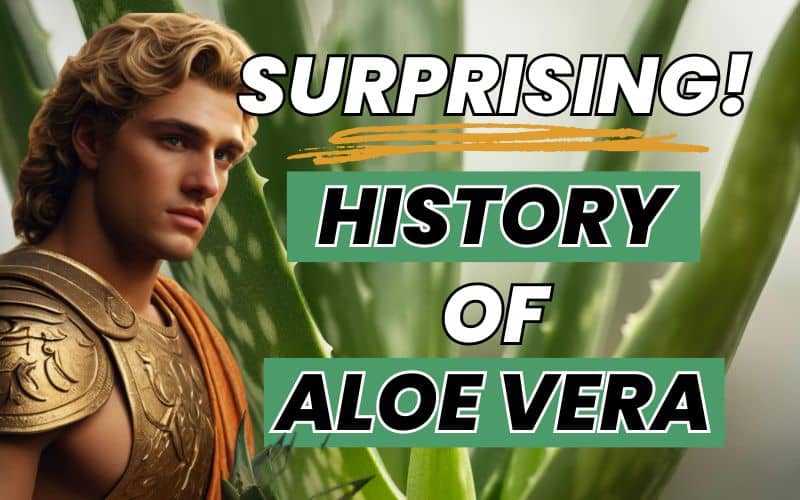
Aloe Vera: Lets Discover It’s Secrets
Aloe vera, the succulent plant with its spiky leaves and gel-filled interior, is a familiar sight in many homes today. Its popularity stems from its wide range of uses, from soothing sunburns to promoting healthy skin and hair.
But the story of aloe vera extends far beyond its contemporary applications. This unassuming plant boasts a rich and fascinating history, filled with surprising facts that reveal its significance in various cultures and eras.
Visit Aloe Store: 🌱Click Here😁

1. Ancient Egyptians Relied on Aloe Vera’s Healing Power
The earliest evidence of aloe vera’s use dates back to ancient Egypt, around 3,500 BC. Egyptians revered the plant for its medicinal properties, calling it the “plant of immortality.”
Hieroglyphic writings on papyrus scrolls and depictions on tomb walls showcase its prominent role in their society. They used aloe vera to treat various ailments, including burns, wounds, skin conditions, and digestive issues.

2. Cleopatra’s Beauty Secret: The Power of Aloe Vera
The legendary Egyptian queen, Cleopatra, is often associated with beauty and self-care. Interestingly, historical accounts suggest that aloe vera was a key ingredient in her beauty regimen.
She supposedly used aloe vera gel to keep her skin hydrated and youthful, highlighting its perceived anti-aging properties.

3. Navigating the Seas with Aloe Vera: A Sailor’s Essential
Beyond its medicinal and cosmetic applications, aloe vera also played a crucial role in ancient maritime exploration.
Sailors valued the plant for its ability to store water and provide relief from sunburn and other skin issues during their long voyages.
They often carried aloe vera plants on board, using them as a natural first-aid kit and source of hydration in harsh conditions.

4. Aristotle and Alexander the Great: A Conquest Fueled by Aloe Vera
Legend has it that the famous Greek philosopher, Aristotle, convinced Alexander the Great to capture the island of Socotra in the Indian Ocean.
This island was known for its abundance of aloe vera plants, and Aristotle is said to have believed that the plant’s healing properties would be invaluable for treating the wounds of Alexander’s soldiers.
While the historical accuracy of this tale is debatable, it underscores the perceived importance of aloe vera in ancient warfare and healing practices.

5. Aloe Vera: A Universal Remedy Across Cultures
While the Egyptians were among the first to document the use of aloe vera, its significance extends far beyond their civilization. Ancient civilizations in Greece, Rome, China, and India all valued the plant for its medicinal properties.
They used aloe vera to treat a wide range of ailments, including digestive disorders, respiratory issues, and even eye problems. This widespread use across diverse cultures showcases the plant’s perceived versatility and potential benefits.

6. Aloe Vera in Medieval Medicine: A Legacy of Healing
During the Middle Ages, aloe vera continued to be a prominent feature in European medicine. Monks cultivated the plant in monasteries, using it to treat wounds, infections, and various skin conditions.
Additionally, aloe vera was mentioned in several medieval medical texts, further solidifying its position as a recognized and trusted remedy in the era.

7. Aloe Vera Travels the New World: A Plant Embraces New Horizons
With the arrival of European explorers in the Americas, aloe vera found its way to a new continent. The Spanish conquistadors recognized the plant’s healing properties and readily adopted its use in their settlements.
The indigenous populations of the Americas also embraced aloe vera, incorporating it into their traditional healing practices.

8. Aloe Vera in the Modern World: Scientific Exploration and Growing Recognition
While aloe vera has been used for centuries based on traditional knowledge and anecdotal evidence, the last few decades have witnessed a surge in scientific research exploring its properties.
Studies have investigated the potential benefits of aloe vera for various conditions, including skin health, wound healing, and digestive issues.
While the research is ongoing, it provides valuable insights into the plant’s potential and contributes to its growing recognition in the modern medical world.

9. Beyond Medicine: The Diverse Applications of Aloe Vera
Beyond its medicinal uses, aloe vera finds application in various other areas. The gel extracted from the plant is used in various cosmetic products, from moisturizers and sunscreens to hair care products.
Additionally, aloe vera juice has gained popularity as a dietary supplement, although its long-term effects and safety need further research.

10. The Future of Aloe Vera
As research into aloe vera continues, its future holds exciting possibilities. Here are some potential areas of exploration:
- Further research on potential health benefits: Ongoing scientific studies are investigating the potential benefits of aloe vera for various conditions, including diabetes, arthritis, and even certain types of cancer. While more research is needed to confirm these potential benefits and establish safe and effective dosages, these explorations could hold promise for future medical applications.
- Development of new products and applications: The diverse properties of aloe vera offer opportunities for developing new products and applications across various fields. This could include advancements in wound healing treatments, development of more effective cosmetic products, and even exploration of its potential as a biofuel source.
- Sustainable cultivation and ethical sourcing: As the demand for aloe vera products grows, ensuring sustainable cultivation practices and ethical sourcing becomes crucial. This involves promoting responsible farming methods that minimize environmental impact and ensure fair treatment of workers involved in the aloe vera industry.
By continuing research, exploring new applications, and promoting sustainable practices, the future of aloe vera appears promising.
This remarkable plant, with its rich history and potential benefits, is likely to remain a relevant and valuable resource in the years to come.
Conclusion
Aloe vera’s journey through history paints a compelling picture of its enduring significance across cultures and time periods.
From its ancient applications in wound healing and skincare to its potential role in modern medicine and diverse modern uses, this versatile plant continues to capture our attention and spark scientific curiosity.
As we delve deeper into understanding its properties and explore its potential in various fields, the future of aloe vera promises exciting possibilities for improving health, well-being, and sustainability.
Read – Aloe Vera Benefits: Discover Its Top Properties🌱
(#aloevera #history #ancientremedies)




